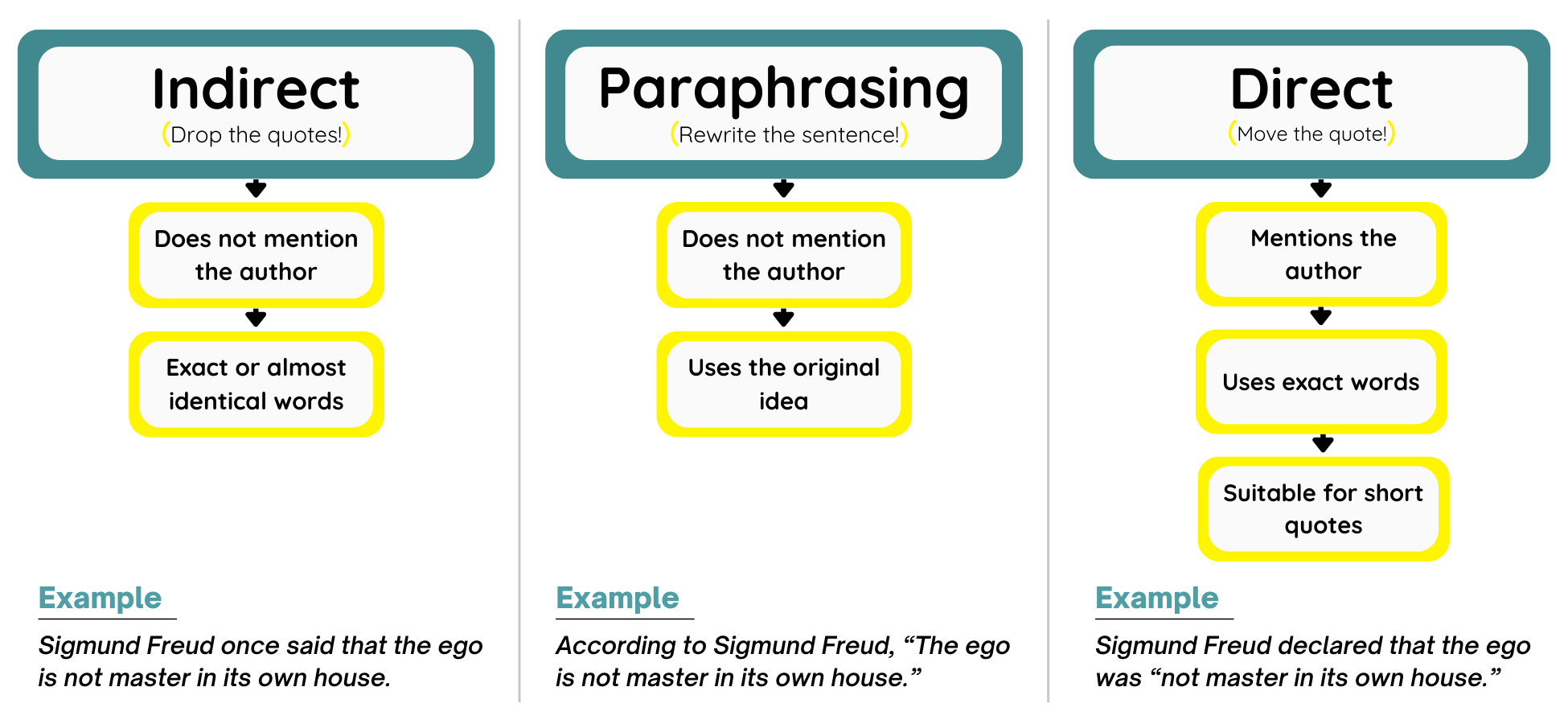Quotation Marks in Direct and Indirect Quotes
When you write a paper, it is crucial to give credit to authors whose works you have used. By citing the sources, you let others locate the materials you consulted. Moreover, properly cited materials will help you avoid plagiarism.
Table of contents
Direct quotes
In direct speech, you quote the exact words that were spoken or written by someone else.
- ✔️ Michael smiled and said, “Yes.”
- ✔️ "What’s going on?" I asked with exasperation.
A direct quote receives its own set of quotation marks. A speech tag such as he said or he wrote is required before or after it.
- ✔️ Karl Marx wrote, “The history of all hitherto existing society is the history of class struggles.”
- ✔️ He said, "How can people ignore the basic rules while driving a car?"
While using direct quotes, you should pay attention to different nuances. Check some of them below:
| Use | Example |
|---|---|
| You need to use a capital letter at the beginning of each direct quotation. | He said, "I don't care." |
| When a quote is interrupted mid-way through the sentence, you do not need to begin the second part of the sentence with a capital. | “He loves to play cards, “Jane said, “especially outside.” |
| When mentioning the person who is being quoted, you need to use a comma after the dialogue tag and before the quotation marks. | “I don't understand,” said John, “why we need passports to travel to other EU countries.” |
| When quoting long passages with more than four-typed lines, you do not use quotation marks. | According to Winston Churchill, One would have thought that if there was one cause in the world which the Conservative party would have hastened to defend, it would be the cause of the British Empire in India … Our fight is hard. It will also be long … But win or lose, we must do our duty. If the British people are to lose their Indian Empire, they shall do so with their eyes open. |
| When quoting poetry that consists of three lines or more, you do not use quotation marks. The poem needs to be quoted as the poet wrote it. | In “Revelation,” Robert Frost demonstrates the way in which we perceive the surrounding world: We make ourselves a place apart Behind light words that tease and flout, But oh, the agitated hear Till someone really find us out. (1-4) |
Indirect quotes
In indirect speech, you report someone’s words, but without quotation marks. You use a different tense and a different sentence structure.
- ✔️ He wondered whether Monica would say yes.
- ✔️ He replied that he really ought to go home.
Remember that the words enclosed in quotes must be the exact words of the person being quoted. Anything which does not belong to those exact words must be taken outside the quotes, even if this means using two sets of quotes. The following example is wrong:
- ❌ Sigmund Freud once said that "The ego is not master in its own house."
- ❌ John F. Kennedy stated that “Every accomplishment starts with the decision to try.”
Why is it wrong? The passage inside the quotes does not reflect the author’s exact words. There are three ways of fixing this.

All three examples work perfectly to convey Freud’s exact words. Which one are you going to use? It’s up to you.
Sometimes it can be confusing to decide whether to use quotation marks or not. The trick is to figure out whether the person literally said or wrote the words. If you are just conveying the general sense of their words, you don’t need to use quotation marks.
